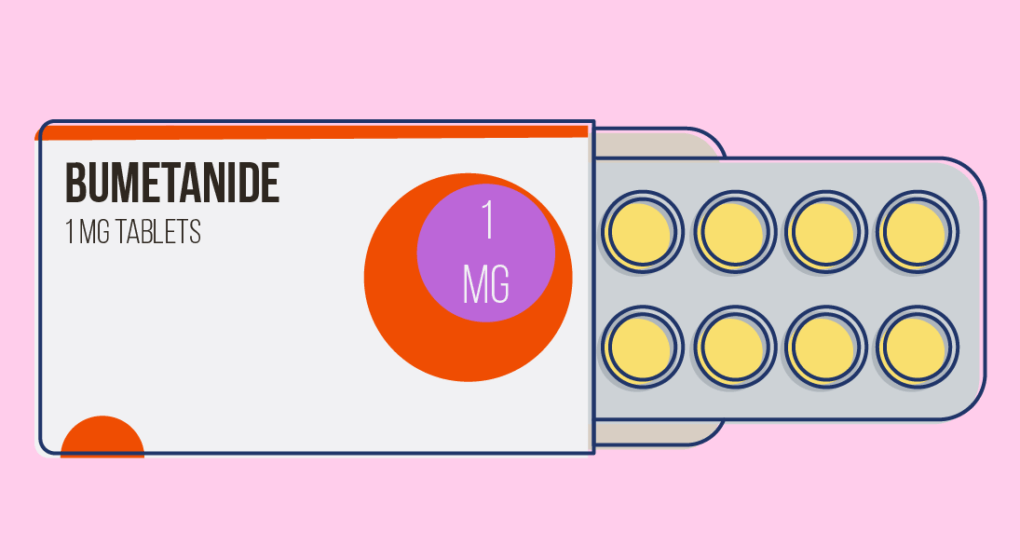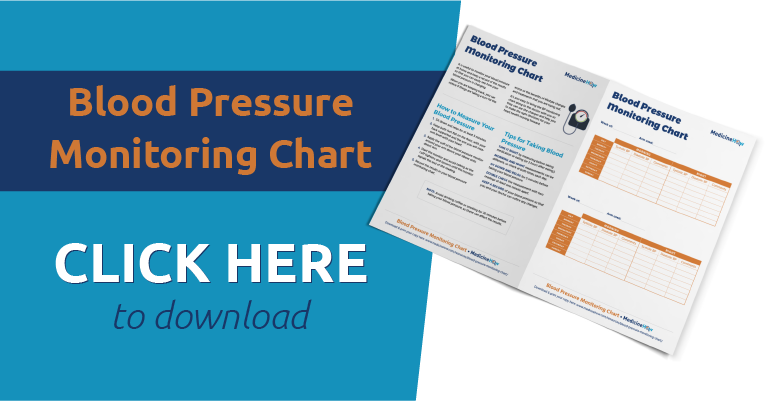
Bumetanide is a type of drug called a loop diuretic, which works to increase urination by changing the way your kidneys work to produce and excrete urine.
If you or someone you know is taking bumetanide and you’d like to know more about how it works, this article should have some helpful information for you.
Brand Names and Doses
![]() Bumetanide is the generic name of the drug, which is the name of the active ingredient inside your medication. You might also know it by he brand name written on the packaging, such as Burinex, which is the name given by the manufacturing company.
Bumetanide is the generic name of the drug, which is the name of the active ingredient inside your medication. You might also know it by he brand name written on the packaging, such as Burinex, which is the name given by the manufacturing company.
There is just one dose of bumetanide available: 1 mg tablets. Most people start with one per day and may need to increase the dose (number of tablets) according to how their body responds.
As this medication is designed to make you urinate more often, it is best to take it in the morning because it will be easier for you to reach a toilet during the day. If you take it before bedtime, for example, you may need to get up several times during the night to relieve yourself.
What type of drug is it?
![]() Bumetanide is a type of drug called a loop diuretic. This is a class of medications that work in a similar way in the body. Other drugs in the same class are:
Bumetanide is a type of drug called a loop diuretic. This is a class of medications that work in a similar way in the body. Other drugs in the same class are:
Unlike frusemide, bumetanide is only available in an oral formulation (not IV) but it can be a good alternative if you experience a rash or allergic reaction to frusemide. Ethacrynic acid is more likely to cause side effects such as ototoxicity.
What is bumetanide used for?
![]() Bumetanide is commonly used if you have oedema, which involves swelling or pooling of fluid in your body, particularly your feet and ankles.
Bumetanide is commonly used if you have oedema, which involves swelling or pooling of fluid in your body, particularly your feet and ankles.
Oedema is a symptom of several different health conditions including:
- Heart failure
- Hepatic cirrhosis
- Renal impairment
- Nephrotic syndrome
If you have any of these conditions and notice swelling in your feet or other areas of your body, your doctor may recommend bumetanide to drain the fluid and reduce the swelling.
How does bumetanide work?
![]() Bumetanide works by changing the way that urine is produced in your kidneys, leading to an increased production of urine.
Bumetanide works by changing the way that urine is produced in your kidneys, leading to an increased production of urine.
Usually, your blood is filtered into your kidneys and goes through a series of tubes where different components are reabsorbed back into the bloodstream or continue to be excreted in the urine. One of these tubes is called the “loop of Henle” and it is this area of the nephrons in the kidneys that is altered.
When you take bumetanide, it stops the sodium and chloride ions from being reabsorbed into the blood stream as they usually would. As a result, more of these ions is excreted in the urine, along with more water (water follows the salts to balance the concentration).
It is a potent diuretic and causes a significant increase in the excretion of urine because it is in the loop of Henle that most of the sodium is usually reabsorbed.
Side Effects
![]() The most common side effects of bumetanide are related to an imbalance of salts in your blood, which occur because of the changes in the salts that are excreted in the urine. You may have:
The most common side effects of bumetanide are related to an imbalance of salts in your blood, which occur because of the changes in the salts that are excreted in the urine. You may have:
- Low sodium levels (hyponatremia)
- Low potassium levels (hyponatremia)
- Low magnesium levels (hypomagnesia)
- High uric acid levels (hyperuricemia)
You may feel dehydrated, dizzy, or have episodes of gout or low blood pressure.
If you notice these signs, it is likely that the dose of bumetanide is too high. It is best for you to discuss this with you doctor, who will help you to find the right dose.
Cautions
![]() Bumetanide is not the best choice for every patient and there are some people who should avoid taking this drug. Your doctor may opt for a different drug if you:
Bumetanide is not the best choice for every patient and there are some people who should avoid taking this drug. Your doctor may opt for a different drug if you:
- Are allergic to bumetanide
- Are affected by prostatic obstruction (may cause acute urinary retention)
- Suffer from gout (may precipitate an attack)
Additionally, bumetanide is contraindicated and should bot be used if you are severely dehydrated or have an imbalance of electrolytes in your blood, as it can worsen this.
Interactions
![]() Bumetanide may interact with some other medications that you are taking. In particular, it can cause problems when used with other medications that affect the levels of potassium in the blood because the risk of hypokalemia is higher. These medications include:
Bumetanide may interact with some other medications that you are taking. In particular, it can cause problems when used with other medications that affect the levels of potassium in the blood because the risk of hypokalemia is higher. These medications include:
- ACE inhibitors
- Lithium
- NSAIDS
- Sartans
- Thiazide diuretics
Make sure that your doctor knows if your are taking any of these drugs (particularly NSAIDS such as ibuprofen or aspirin that can be bought over-the-counter in a pharmacy or supermarket) so that they can change the dose as needed.
Pregnancy and Breastfeeding
![]() Bumetanide is not usually used for women who are pregnant, as changes in the electrolytes in the blood could directly affect your child and there is a risk of neonatal thrombocytopenia. Your doctor may recommend it in rare circumstances, but if you are taking bumetanide and trying to conceive, it is best to talk to your doctor about your medication options.
Bumetanide is not usually used for women who are pregnant, as changes in the electrolytes in the blood could directly affect your child and there is a risk of neonatal thrombocytopenia. Your doctor may recommend it in rare circumstances, but if you are taking bumetanide and trying to conceive, it is best to talk to your doctor about your medication options.
There is little research about the use of bumetanide for women who are breastfeeding, so we don’t know how safe it is. It is sometimes used, but it is important to monitor for signs in your baby to take action if needed.
Pin it!


